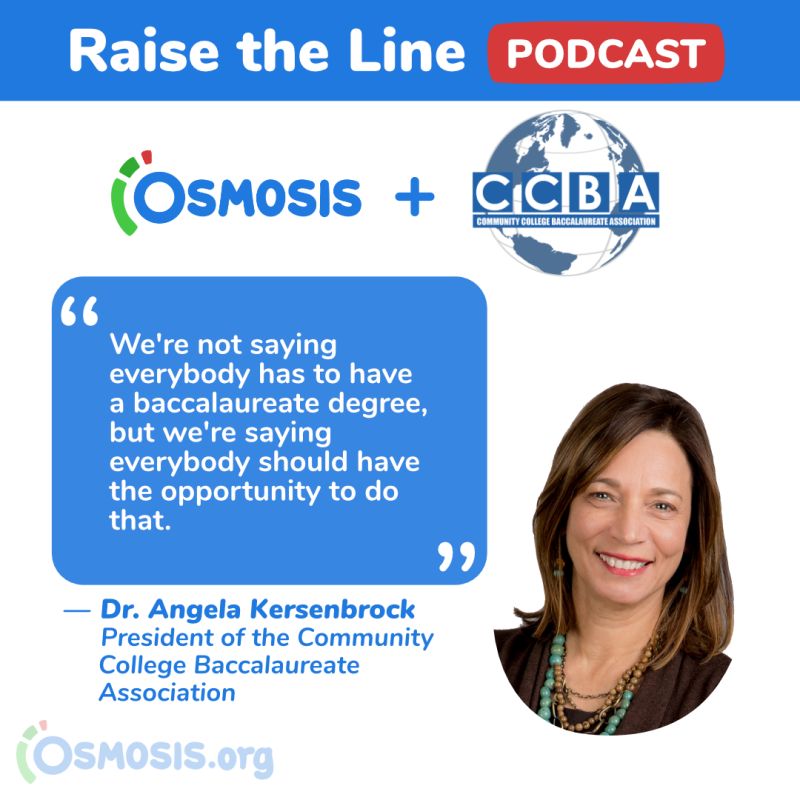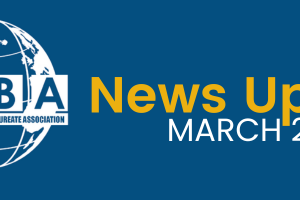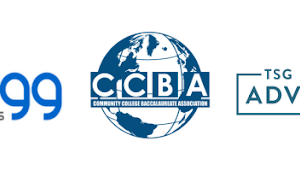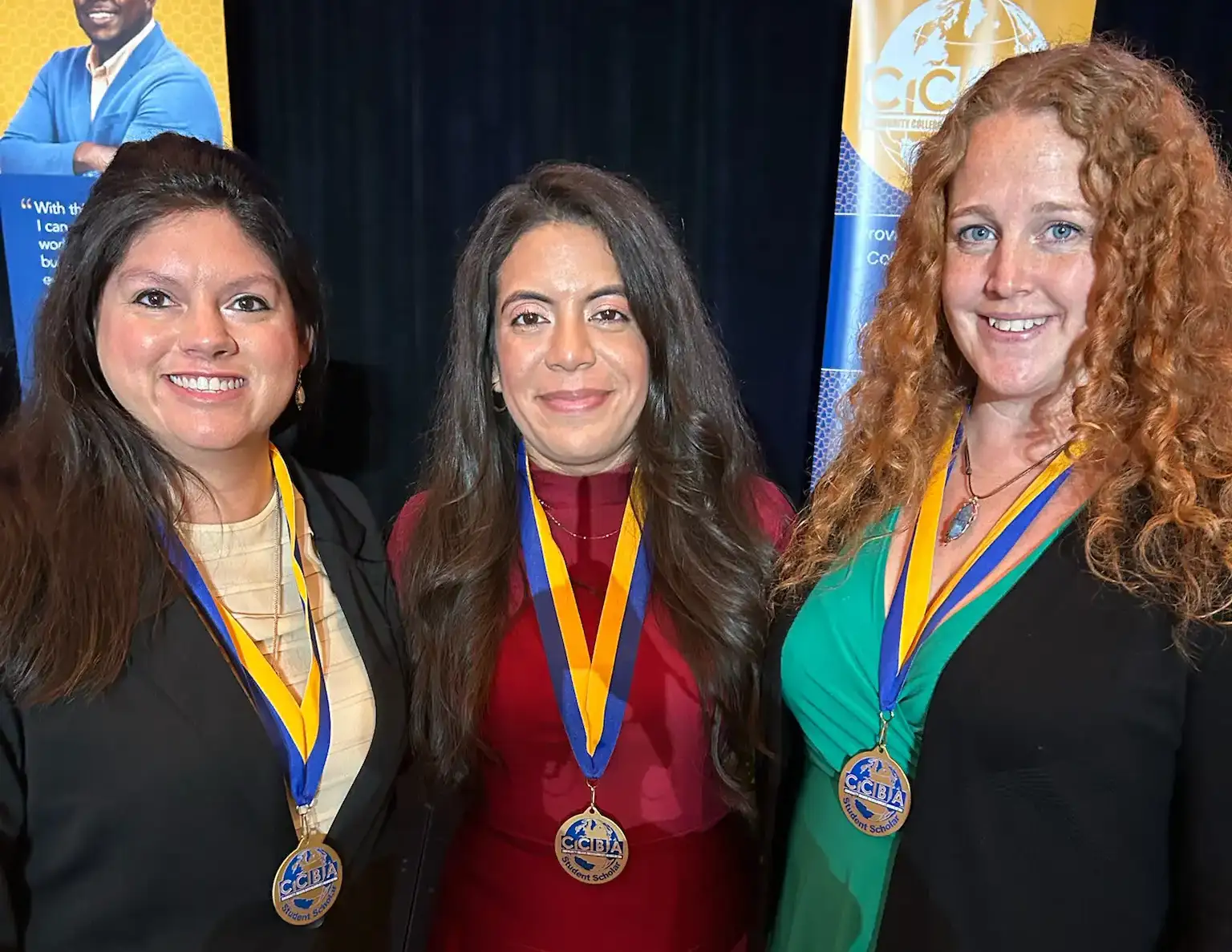Making Family-Sustaining Careers Possible – Dr. Angela Kersenbrock on Raise The Line Podcast
How is the CCBA’s work helping to make family-sustaining careers possible? CCBA President Dr. Angela Kersenbrock discusses some of the common misconceptions about community college baccalaureate degrees with Osmosis.org. In this episode of Raise the Line, she joins host Dr. Rishi Desai to discuss the steps the CCBA is taking to make these life-altering credentials more accessible.
Listen to the Episode
Transcript of Episode 173 of Raise The Line:
RISHI DESAI: Hi, I’m Dr. Rishi Desai. Today on Raise the Line, I’m happy to be joined by Dr. Angela Kersenbrock, President of the Community College Baccalaureate Association. Angela holds a doctorate in higher education and public policy and a master’s in nursing. She’s been involved with workforce education programs and has developed nearly 30 degree and certificate programs, including baccalaureate programs in nursing health sciences and information systems. In her current role, Angela is focused on leading the CCBA in its mission to help learners get prepared for family-sustaining careers. Thanks so much for being with us today.
DR ANGELA KERSENBROCK: Thank you for asking me.
RISHI DESAI: Well, I’d like to start with just asking about how you’re doing, how your family is doing during COVID. A lot of things are topsy-turvy, so I’d like to start there.
DR ANGELA KERSENBROCK: Well, thank you for asking. I think we’re doing pretty well. It’s been a while, so we’ve gotten used to all of this and we’re nearing the end. Also, we’re in Florida, so the rules are a little bit different here. We’ve got beautiful weather. You could be outside a lot. Restaurants are open, so we’re all doing fine. We’ve been very lucky. A few of our family members have gotten COVID, but everybody’s recovered fully. How about you and your family?
RISHI DESAI: Yeah, similar. So I’m in Oakland, California and so it’s been more locked down than it sounds like things are in Florida at the moment. Having said that, similarly, my own family is doing quite well. I think right now that’s the biggest blessing, is just making sure we all get through this safe and sound, so I appreciate you asking as well. One thing that caught my eye, and I know you know this because I mentioned it just now, but it’s that phrase, ‘family-sustaining careers.’ We were just talking about one another’s families. I’d love for you to reflect on how you think about that phrase and how that even became something that’s so important to the CCBA, if we can start there.
DR ANGELA KERSENBROCK: Sure. Well, I love that phrase. I actually think I made it up, but I didn’t, but it was one of those things that you read and you take it in. You really embrace it and that has really, I think, guided our work as a Community College Baccalaureate Association. I think as I work in higher education with any of the programs, what you don’t ever want to do is educate somebody so they can stay in poverty. You want to not give a hand, but you want to give a hand up, “Let me help you to get on this path to middle-class and upper-middle-class.” So, everything, I think, is in that phrase. It’s living in a good neighborhood. It’s having access to good healthcare. It’s having sidewalks so your children can walk and ride their bikes. So, so many things go into that. When I hear that phrase, it immediately conjures up people that are able to participate in the American dream.
RISHI DESAI: It also feels like, nowadays, everyone recognizes that people have a family. I think there was a time maybe when you showed up professionally and then there’s a personal life. Now, the two are blurred a lot more and people recognize that you’re not just this person that shows up from maybe 8:00 to 5:00 or 9:00 to 5:00, but that you have this other side of you, this family that you have to care for and think about as well. That’s just such an important change that I think this happened. Have you noticed that also?
DR ANGELA KERSENBROCK: I think as women, we’re always constantly thinking of that, so you’re at work and you’re juggling dentist appointments and soccer practice and all of those kinds of things. I think we were always aware of that, but you tried to keep it a little bit on the low, particularly, with your male colleagues. But now, it’s out there because my sons are taking care of families and driving kids places and so are all of my colleagues and I think it just gives a much more well-rounded, complete dimensional picture of what people deal with every day.
RISHI DESAI: I totally agree and it feels, in some ways, that we can all be a little bit more honest about ourselves. We don’t have to, like you said, you had to keep it maybe on the DL, and it doesn’t always feel good, right? You’re not a bad employee; you’re just trying to be a good human being and we all have responsibilities. So yeah, that’s a really great change, I think. Maybe on that front, I’d love to hear your own background, like when you were growing up. What initially got you even on this pathway to healthcare and thinking about this as a potential profession for yourself?
DR ANGELA KERSENBROCK: Oh, gosh. That’s interesting to me only, probably. So I grew up in inner city Boston. I grew up in an all 100% Italian neighborhood. We were all immigrant kids and your parents were pushing into you, “You’re going to do better than me. You’re going to do better. You’re going to do better.” So that was something that we internalized. In high school I loved the sciences, but I was a child of the 60s and so when people were talking about women in the workforce, they were thinking education, healthcare, nursing, maybe dental assisting or something. So, I chose nursing and I have never regretted that decision one day in my life. Maybe after couple of the shifts, I might have really gone, what am I doing?
But overall, it’s been a great career and it’s really allowed me to do so many more things than I was initially thinking I was going to do when I was in college. I got my bachelor’s and worked my way through school as a nursing assistant and home health aide. I completely appreciate this ladder approach that so many of the colleges are doing, because that is what enabled me to go through school and then later, get my master’s while I was having children. Then I taught. I think this is an interesting story, particularly if you’re my age. We were the age of sit-ins, and peaceful sit-ins. In college, our Dean was switching some things around that was going to require me to go to school during the summer and I couldn’t do that because I couldn’t afford to pay for another semester without working. So, we held a peaceful protest in her office-
RISHI DESAI: Oh, wow.
DR ANGELA KERSENBROCK:… and she was so gracious about it. She invited us in and we got to sit there for a couple of days, leaving for meals because after all we had our priorities straight (laughs)…
RISHI DESAI: (laughs)
DR ANGELA KERSENBROCK: …but she invited us in so that we could watch what she was doing. She was dealing with budget and personnel and admissions and curriculum, all these things. I left there thinking, “This is what I want to do with my life. One day I want to be a dean of nursing.” So that got me off on this path and that happened for me and I was really excited about it. I kept in contact with her for a while and she’s since passed on, but that sit-in changed my life. I don’t know what I would’ve done otherwise, certainly not higher ed because I never ever considered it until that day.
RISHI DESAI: Just so I understand the context, you went in to protest some injustice and then, she invited you to watch her and then you said, “Actually, I kind of like your job and maybe you can be my mentor.” Is that accurate?
DR ANGELA KERSENBROCK: Well, so there were several of us in her office. She had a nice big office, so she invited us all in. She gave us Cokes. She was bringing in snacks. She was a lovely, lovely woman. We left there and one of my friends said to me, “I am never going into higher education,” when she saw everything she had to deal with. I had the opposite reaction. My reaction was, “Oh, this is great. This is so challenging and so fun. I want to do this.”
RISHI DESAI: I really am so curious, in your career, have you ever had anyone protest your office or something?
DR ANGELA KERSENBROCK: No. (laughs)
RISHI DESAI:… because if that were to happen, the bar is high in terms of-
DR ANGELA KERSENBROCK: …if they would have left unhappy, I would have been like, “I’m a failure.” (laughs)
RISHI DESAI: Oh. Wow. That’s a remarkable story and a very inspiring one because that person was a real mentor, a real leader for you.
DR ANGELA KERSENBROCK: Without even knowing it. Just being gracious and open and listening. I just thought she was brilliant.
RISHI DESAI: So, tell me more about the CCBA then, and how do you guys work specifically with colleges and with students? You’re a couple of degrees removed, then, from the student because you work with the colleges. How does that relationship work and what are the parts of that relationship that you enjoy the most?
DR ANGELA KERSENBROCK: So, I enjoy every bit of it. I retired in2018 and I wasn’t sure what I was going to do, and so this just fell in my lap. It was another one of those experiences where the universe is putting something in front of you. The last few years of my career at Seminole State College, I was writing baccalaureate degrees because they were workforce-focused, so that was what we were doing and I just saw the incredible impact that these degrees had on people. The average age is like 31, 32. They are a student who’s been, we’ll say, they were taking the scenic route to their bachelor’s degree, right? They were, come in/come out, drop in/drop out, get a part-time job/get a full-time job, all those kinds of things, kids, car payments, all of those.
Mostly, students never thought, “Well, I’m going to go back and get my bachelor’s degree.” They really weren’t thinking that, and so the baccalaureate gave them that opportunity. It gave them pause to think, “Well, maybe we could do this.” We worked a lot with industries saying, “All those folks that are working for you that have these associate degrees, wouldn’t it be great if … ?” So that’s, essentially, how I got my start doing this. Right now, there are 23 states in the U.S. that allow community colleges to offer some level of baccalaureate degrees and then there are several others this legislative session that are considering this. California, where you are, they allow pilot programs in, I think, 14 community colleges, but up for legislative vote this session is whether or not California allows all the community colleges to be able to offer that.
So, we work with the chancellor’s offices and we’ve worked with some schools. Arizona is doing something similar in that they’re trying to get legislation to approve community colleges for the first time offering baccalaureate degrees in Arizona. So, we work with legislators, we work with colleges, we work with the community college associations and different groups helping to work on legislation that brings about a win-win for the universities, because this isn’t an ‘us or they.’ This isn’t what that is. There are enough people in the United States who still need a baccalaureate degree that we don’t have to have that discussion anymore, I think. We work on the wording and the rules for that. Then, once colleges get the baccalaureate degree, how do you develop a proposal? How do you work with your industry? Make sure you use labor market data?
You don’t want to start a baccalaureate degree and then there’s no jobs. We are promising that if you finish this degree, there are going to be well-paying jobs for you. If we promise that, then we need to make sure we do everything we can to keep that promise. So that’s what we’re all about. We do some consulting kinds of things. People call us on the phone, write us letters. We have a website that’s a lot more active now than it used to be. We do some social media stuff and then we have our conference. We’re doing an inventory of every state, every college, every program that every college has and the best practices so that people don’t have to reinvent the wheel, just improve upon the wheel. So those are some of the things we do.
RISHI DESAI: That’s a lot of work and it’s also such incredibly important timing, because unemployment has, obviously, recently spiked. You’ve got a new administration in power in the U.S. You have 23 states that have said, “Yes, we like this idea,” 27 that are maybe not there yet. What is the main concern, if you could call it that, from the 27 states or what are the main concerns that you and your team can help navigate or offer some insights into?
DR ANGELA KERSENBROCK: Well, I think, if you don’t mind, we’ll start with the driving factors. What pushes a state to do this? I think a state like Wyoming, when they moved away from coal, there were a lot of people who lost jobs, industries that closed. Not overnight, but we could use that term. So the state of Wyoming’s thinking, “What are we going to do now? What are our economic goals? How are we going to thrive as a state?” One of the pieces to that is, “What kind of baccalaureates do we need? What kind of industries are we trying to recruit into our state or grow our own? What kind of people do we need? Where are they going to get the skills and education?” To approach it from an economic development standpoint, I think is a really great position. So, there’s that.
Then there’s other states that are looking at their attainment rates and saying, “Gosh, we really need to work on these attainment rates. The percentage of Black males that are getting a baccalaureate degree are really low. So how can we work on that?” I think when we take the perspective of, “What is it that the state is trying to accomplish? What is a community trying to accomplish” then I think the community college baccalaureate is one strategy. That doesn’t dismiss at all what the universities are doing. Doesn’t dismiss at all what vocational certificates do. This is just another pathway, and so that’s the perspective that we take. Sometimes, the universities are concerned, “Okay, duplication of degrees.” It’s an enrollment game. Everybody’s hurting right now for enrollment, so universities don’t want to lose more enrollments.
I think those kinds of things, “Hey, this is our space. You stay in your space” that kind of approach, I tend to just say, “No. I completely get all of these things. I understand them. I worked at a university. I understand. But how about if we do this?” In nursing, they all have nursing programs and most of them have RN to BSN programs and so you would say, “Well, we already have these programs, why do we need more?” Well, you need more because you’re not accepting the 3.2 student, the student who has a 3.0 because they were also working and have a family and all of these other reasons, and so it’s that student who’s falling between the cracks. I think that’s a legitimate reason to have these baccalaureate degrees. So that’s typically it, and we try to have win-win.
I had a president, Ann Magee, and every time we were going to do something controversial, she would hold us up and say, “Well, what’s the win-win for the other group?” Now that would take us a long time to try to figure out that win-win, but I thought it was such a great practice. For universities, it’s, “Well, let’s develop a seamless baccalaureate to master’s program. Let’s do cohort programs. Our faculty need doctorates. We can have joint faculty share positions.” There’s all kinds of ways that you can have a win-win for students because the student who says, “I was never going to the university.” They may be the same student in three years that says, “I bet I can get my masters and now that I’ve done this, my children are going to do this.” Right? So it’s a long game, I know. It’s a long game, but our industries have to help support this. Our universities have to be brave and allow community colleges to do this and we just need to work in partnerships with those goals of family-sustaining wages, economic development, health for everybody.
RISHI DESAI: Have you, on this journey, found interesting, maybe surprising bedfellows like other groups that you would’ve never thought you’d be working side by side with, but have kind of the same goal at the end of the day and as a result, you’re both trying to get this through? Has that happened where you had interesting partners?
DR ANGELA KERSENBROCK: Only over the past two years have we been looking for partners and there’s so many of them. Everything always comes from a place of need, so you need good, strong third-party labor data to prove your point, prove your case. We work with an economic modeling company, EMSI. They’re a sponsor of ours and so they help schools prove the case. Recruiting adult students is a completely different game. You’re not having a pizza night at the high school. That’s not going to work, right? We have to look for organizations that really understand adult learners. Interact is one of those companies. Western Governors University is another. You would think Western Governors and CCBA would be competitive, but we’re not because we both understand that we need to have multiple pathways to the baccalaureate degree and advanced degrees and so we work together.
I think everybody who is a partner for us. With NISOD, which is The National Institute for Staff and Organizational Development’s, “How do you get your faculty and your staff ready for this next level of teaching and offering baccalaureate degrees on your campus?” So they have a role to play in that. I think there are so many people that are partners with us because I think we all see what we need. I think COVID has brought home this need so much more than pre- COVID. I read Michael Hyatt a lot. I’m a full focus planner junkie and he says, “When things go bad, well, what does this make possible?” It took me a while to get to, “Well, what does this make possible?” But it makes possible partnerships that we hadn’t had before, because it forces you to call people on the phone and have conversations with them and everybody is trying to do the right thing.
RISHI DESAI: That makes a lot of sense, and it makes me realize that there’s probably so many misconceptions and misunderstandings in this space that, obviously, with 23 state partners that you’ve gotten across the line, that you’ve been able to clear up. Do you mind sharing with me, what are some of the common things you hear about this movement or about this idea that is just not true, or is this not quite true, that maybe our listeners can get corrected?
DR ANGELA KERSENBROCK: Okay, so many. So one thing is, “People don’t need baccalaureates. They should just focus on the basics.” We heard that one on a Facebook post this week. Well, okay. People don’t need baccalaureates, but let’s take a look at the great recession in 2008. The people who lost their jobs were those people who didn’t have baccalaureate degrees. Let’s look at our work from home economy now. Who are not employed? People who didn’t have baccalaureates, couldn’t work from a computer at home. So, this idea that you don’t need a baccalaureate degree…I love that when people say that it’s always about somebody else doesn’t need a baccalaureate degree. Their kids need one. They have one, but maybe somebody else doesn’t. So, my Italian comes out a little bit on that one, you know?
RISHI DESAI: (laughs)
DR ANGELA KERSENBROCK: I ran apprenticeship programs for 15 years. I completely value plumbing, electrical, sheet metal, all of those. Completely. But if somebody wants to own their own company, which I really want them to do, wouldn’t it make sense that they have a bachelor’s degree in business so that they know how to do that? We’re not saying everybody has to have a baccalaureate degree, but we’re saying everybody should have the opportunity to do that. I think that is one misconception.
Another is, “This is mission creep for the community colleges. They’re getting out of their lane.” Well, if community colleges, which I believe, and many people believe, are about workforce — we’re the workforce engine for a community — then these baccalaureates, and every one of them are workforce-focused, high skill, high need, typically, high demand, high salary, maybe with the exception of early childhood, those are workforce degrees. The community colleges should be responding and they are responding to their community’s needs. Who knows better what that community needs than the economic development council in conjunction with the community colleges and the industry? So, I think that’s another misconception.
Another is, “Well, the community colleges aren’t capable of offering baccalaureate degrees.” I think that that is…I don’t know, I’m not even sure where that comes from. When I was a dean, I had so many of my faculty at the community college also teaching part-time at the university. So how can you say that they’re not qualified? The accreditation rigor that you go through for nursing, respiratory care, PTA, dental hygiene, those are incredibly rigorous processes. So yes, I think that they’re completely capable, but that is something that the college has to assess.
Are we capable? Do we have the bandwidth? Do we have the resources to do that? That’s something that a college has to think about definitely well before they start this process so they can get ready. I think one of the most challenging type of person to teach is somebody who has three kids at home, they’re working a full-time job, they don’t have all the resources, their parents didn’t go to college. Those are more challenging people to teach because I think that you’ve got to really tap into the motivation and you have to do it in a very relevant way. I’ve never seen where one of these adults is looking for, “Just give me an A.” That is not what they’re about because on Monday morning, they have to show up at that job with those skills, right? So, I see them as being so much more motivated than maybe the 18 or 19-year-old who’s not really sure what they’re going to be doing yet.
RISHI DESAI: Yeah.
DR ANGELA KERSENBROCK: We’re hitting all my passions. (laughs)
RISHI DESAI:(laughs) No, I can see that and I definitely appreciate the fact that your passion is coming through because, especially with adult learners, I think that the moment something is not relevant, they recognize that the time spent could be time spent with their child or with their significant other or with their parent. That, oftentimes, is not as true for a younger learner. That’s a very direct realistic thing like, “If I’m not learning, you’re not just not preparing me, but I literally just lost an hour with my kid and that trade-off just wasn’t worth it.” So, you’ve got to be able to step up your learning game. I think your points are really well taken. Then maybe as a final point, you’ve had such a cool career and I love the anecdote you shared about how you got spurred into this field. What would you suggest that students out there that may be listening — folks early in their professions – that they may want to do to explore? What kind of opportunities might be out there for them, including attending a sit-in?
DR ANGELA KERSENBROCK: On a sit-in?
RISHI DESAI: Yeah.
DR ANGELA KERSENBROCK: (laughs)Well, I think students today have so many more advantages. The internet opens up the world. I know listening to podcasts and being exposed to other ideas, other career fields. We were at a conference in Greece a few years back and the minister of education said, “When I graduated, my job was to look for a job. Now, when you graduate, students,” — because there was a protest at that conference — “when you graduate, you need to invent a job.” And so I would say, continue looking. Do things the way you want to do them. Manage your life the way you want to manage your life. But there’s so much knowledge out there. You’ve got to be willing to learn something new every single day. I’m old school, so I was going to say, get your masters, get a doctorate, contribute back to society. But the biggest thing is to continue learning and don’t be afraid of failure. If you don’t fail, it means you just tried to do something easy and that is not going to serve you. I don’t know, is that a good enough answer?
RISHI DESAI: That’s a lovely answer. When you said you’re old school, I thought you were going to say be better than your parents, because you had mentioned that your parents said that to you. (laughs)
DR ANGELA KERSENBROCK: Yeah.
RISHI DESAI: But I think that your advice is spot on.
DR ANGELA KERSENBROCK: That’s easy for them, right? That’s easy. (laughs)
RISHI DESAI: (laughs)Yeah, exactly. Be better than the generation that proceeded you. No, I think that’s a really interesting point about there was a time when you would be assigned a job and nowadays, people talk about figuring out what your job is going to be based on the problems that you see in the world. That’s a wonderful point, so thank you for making it.
DR ANGELA KERSENBROCK: It’s that intersection between a problem that you see in the world and your passion. If you can intersect those and live in that space, you know, that’s a great life.
RISHI DESAI: It is, and sometimes that space moves and shifts and so just making sure that you’re adaptable and able to move and shift with it is key. Sometimes, that means going back and getting more education, like you said, as an adult learner…
DR ANGELA KERSENBROCK: Absolutely.
RISHI DESAI:…to re-skill and retool, because that mantra of lifelong learning, it’s so true today in a way that it just wasn’t as true, I feel like, a generation or two ago.
DR ANGELA KERSENBROCK: I’m a nurse. You have got to keep up your license. We only have a requirement of 24 contact hours. But 18 months ago, we weren’t thinking about COVID. Look how much we’ve learned just in this span about COVID and delivering care to folks, so.
RISHI DESAI: Well, thank you very much for joining us today. That was a delightful insight into your life and your perspective. I appreciate you sharing that with us.
DR ANGELA KERSENBROCK: Well, thank you for inviting me. I really appreciate that.
RISHI DESAI: I’m Dr. Rishi Desai. Thanks for checking out today’s show. Remember to do your part to flatten the curve and raise the line. We’re all in this together.







